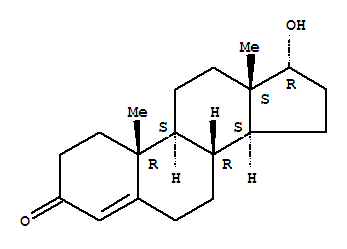| Identification |
| Name: | Androst-4-en-3-one,17-hydroxy-, (17a)- |
| Synonyms: | Androst-4-en-3-one,17a-hydroxy- (8CI);17-Epitestosterone;17a-Hydroxyandrost-4-en-3-one;17a-Hydroxyandrost-4-ene-3-one;17a-Testosterone;17a-cis-Testosterone;4-Androstene-17a-ol-3-one;Androst-4-en-17a-ol-3-one;Isotestosterone;NSC 26499;Testosterone, cis-;cis-Testosterone;epi-Testosterone; |
| CAS: | 481-30-1 |
| Molecular Formula: | C19H28O2 |
| Molecular Weight: | 288.43 |
| InChI: | InChI=1/C19H28O2/c1-18-9-7-13(20)11-12(18)3-4-14-15-5-6-17(21)19(15,2)10-8-16(14)18/h11,14-17,21H,3-10H2,1-2H3/t14-,15-,16-,17+,18-,19-/m0/s1 |
| Molecular Structure: |
 |
| Properties |
| Melting Point: | 218-220?C |
| Density: | 1.12 g/cm3 |
| Refractive index: | 1.56 |
| Water Solubility: | Soluble in alcohols, insoluble in water. |
| Solubility: | Soluble in alcohols, insoluble in water. |
| Appearance: | White or creamy white crystalline powder |
| Specification: |
Off-White to Pale Yellow Solid
usageEng:Testosterone and epitestosterone are endogenous steroids that differ in the configuration of the hydroxyl-bearing carbon at C-17.
Safety Statements:22-36
22:Do not breathe dust
36:Wear suitable protective clothing |
| Storage Temperature: | Refrigerator |
| Usage: | Testosterone and epitestosterone are endogenous steroids that differ in the configuration of the hydroxyl-bearing carbon at C-17. |
| Safety Data |
| Hazard Symbols |
 Xn: Harmful
Xn: Harmful
|
| |
 |